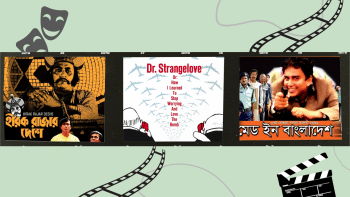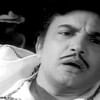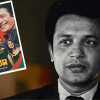Mahanayak Uttam Kumar: The human behind the silver screen persona

Uttam Kumar, the legendary Mahanayak (superhero) who defined Bengali cinema for over three decades, captivated audiences with his oozing silver screen persona. Beyond the glamour and charisma he projected on-screen, he was a man of profound charm and intelligence who lived life on his terms.
Even four decades after his passing, his magnetic allure never seems to fade. From the depths of our nostalgia and everlasting love for the legendary actor, a fan has recently created a series of AI-rendered images that emerged online. These images depict the iconic artiste in modern clothing, transforming him into a contemporary character. Bengalis are hopelessly in love with the eternal charmer who has defied death.
Uttam Kumar, born on this day, 1926, reigned as an undisputed monarch in the world of entertainment, wearing multiple hats as an actor, director, producer, singer, and philanthropist. He breathed life into literary characters and mundane film scripts alike, and, as Satyajit Ray once noted, "Even in films where the director's calibre was questionable, Uttam tried his best to contribute to the overall success of the film; with the better ones he simply excelled."

But what lay beneath the surface of this iconic figure when he shed his charismatic facade and stripped away the fluid mask that conveyed a myriad of emotions and moods? Did he, like us ordinary folks, grapple with emotional turmoil? Though his screen persona exuded confidence, was he ever haunted by the spectre of failure and defeat?
In the acclaimed film "Nayak", directed by Satyajit Ray, Uttam Kumar portrayed a celebrated actor who, during a chance encounter with a journalist on a train journey, bared the tragic dimensions of his glamorous life, exposing his mistakes, insecurities, and regrets. As the young journalist, portrayed by Sharmila Tagore, delves deeper, she uncovers a deeply troubled soul beneath his seemingly arrogant exterior. Looking back, this film appears to offer a glimpse into the real Uttam Kumar.

"In my heart, I know – nothing, not this light or this radiance – nothing will last. This light might snuff out at any moment and throw me into deeper darkness."
Uttam Kumar had written these lines in his book "Amar Ami" before his death. By some strange coincidence, on the day he died (July 24, 1980), the manuscript of "Amar Ami" went missing, only to be recovered much later and published in the form of a book by Saptarshi Prakashan. The actor, who had been documenting his phenomenal personal and professional journey in this book, spoke his heart out about his life as a star, his struggles, his loneliness and much more.
These lines clearly depict the immense loneliness and insecurity that had gone into such writing, emotions that one doesn't really expect from a phenomenally successful superstar who is loved and adored by millions. Uttam Kumar was loved by millions of people not only because he was a brilliant performer but was also a very genuine human being. His goodness seeped in through his persona. He was loved both on screen and off screen as well.
Born Arun Kumar Chatterjee, Uttam Kumar never forgot his humble beginnings. Despite pursuing higher education at Goenka College of Commerce and Business Administration, he couldn't complete his studies due to financial constraints and found work as a clerk at the Kolkata Port Trust. It was during this time that he dabbled in amateur theatre groups. Uttam's cinematic debut in "Drishtidan" (1948), directed by Nitin Bose, was less than auspicious, as he faced a string of flops, earning him the moniker "Flop Master General". During this period, every time he entered the studio, people would jeer at him, commenting things like, "Here comes the new Durgadas…" and "Meet the new Chhabi Biswas…".

He considered leaving the world of cinema and resuming his career at Calcutta Port Trust. However, despite the jeers and discouragement he faced, he persevered, thanks in no small part to his unwavering support system in the form of his wife, Gouri Chatterjee, who urged him to pursue his dreams in the film industry.
His fortunes changed when he signed with MP Studios for three years and starred in "Basu Paribar", grabbing the attention. The turning point came in 1953 with "Sharey Chuattor", where he was paired opposite Suchitra Sen. The film ran for an astounding 65 weeks, catapulting Uttam into stardom. In 1954, "Agni Pariksha" marked the beginning of a new era in romantic films, with Uttam Kumar and Suchitra Sen becoming an iconic on-screen couple, creating cinematic history.
Uttam Kumar and Suchitra Sen's platonic love
Bengali matinee idol Uttam Kumar, with his charming and infectious smile, and Suchitra Sen, with her bewitching beauty and charismatic looks, were the first on-screen couple to hit the screen and reign as an unbeatable romantic pair for more than three decades. The duo mesmerised generations of Bengali cine lovers with their on-screen chemistry. Uttam-Suchitra's captivating romance provided ample fuel for the gossip mills that kept spinning fantastic tales of amour for decades. Even to this day, long after their demise, people speculate about their relationship, which they feel "was enigmatic".

Of the 60 films Suchitra Sen worked in her career, 30 were with Uttam Kumar. The magical duo gave a string of hits and ushered in what came to be known as the golden era of Bengali cinema. After "Sharey Chuattar" and "Agni Pariksha", the Uttam-Suchitra era started. In 1972, the duo starred in "Haar Mana Haar" and then in "Priyo Bandhobi" in 1975, their last film together.
Both Uttam Kumar and Suchitra Sen had tremendous respect for each other. People from the film industry insist their relationship was based on mutual trust, appreciation and admiration for each other's work and personality. They were good friends, and their camaraderie went beyond their professional encounters on shooting floors and studios. However, they were both superachievers in their own spheres and were egoists to the boot. There were times when disagreements over apparently minor issues led to misunderstandings between the two legendary stars. One such row built up during the shooting of Agradoot's film, "Pothe Holo Deri" (1957).

However, both Uttam Kumar and Suchitra Sen maintained a dignified presence in public, although their mutual adulation was palpable. They frequently reached out to each other during trying times and offered advice and solace to each other.
Once, Uttam Kumar got entangled in a brief infatuation with one of his co-stars, a dalliance that the entire film unit recognised lacked any genuine affection. Suchitra Sen stepped in and offered him gentle counsel. She advised, "Utu (that's how she addressed him at times), come out of this murky affair. There is no future in this alliance." In a touching gesture of respect and gratitude, both Uttam Kumar and Supriya Devi (his former wife) never forgot to send a bouquet to Suchitra Sen, extending warm birthday wishes year after year.
The other facets of the Mahanayak's persona
Despite his success and adoration, Uttam Kumar remained grounded. He seized every opportunity to express gratitude to the film industry by assisting those within it. Uttam's life exhibited two distinct sides—the charismatic, flamboyant Mahanayak (superhero) and the empathetic man who stood up for the less fortunate. His eagerness to help the needy earned him profound respect from producers, directors, and fellow actors alike.
Kumar was active in the Indian independence movement. In 1945, he helped Subhas Chandra Bose's Indian National Army relief fund, arranging a performance of the play Anandamath and giving the profit worth Rs 1700 to Bose's elder brother Satish Chandra Bose. He also engaged in the Kolkata communal riots of 1946.
Even as Uttam Kumar reigned supreme in Tollywood, Uttam Kumar extended empathy to struggling, emerging actors and offered unwavering support. Few actors have matched his contributions to the industry and its members during their superstar years.
Through his foundation, Shilpi Sangshad, he ensured pensions for retired actors and actively participated in fundraising road shows organised by the film fraternity to aid victims of natural disasters. Uttam Kumar would be on the streets of Calcutta, personally appealing for donations, leaving citizens in awe as they encountered their matinee idol up close. He was the subject of fantastic folklore.
As we celebrate Uttam Kumar's 97th birth anniversary today, we find ourselves drawn even closer to the enduring legacy of this cinematic legend. His life was a tapestry woven with passion, talent, and humanity. Beyond the glitz and glamour of the silver screen, Uttam Kumar was a man of depth and sincerity, navigating both the highs and lows of his personal and professional journey.
Throughout his life, Uttam Kumar loved people, and in return, they adored him immensely. The passage of time has not dimmed his memory in public recollection, with tributes continuing to pour in, even after 40 years. Yet, isn't it a poignant anomaly that this man, who was so deeply loved, felt lonely and lost in the end?

 For all latest news, follow The Daily Star's Google News channel.
For all latest news, follow The Daily Star's Google News channel. 











Comments